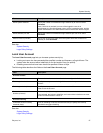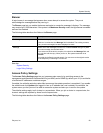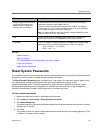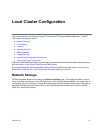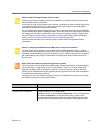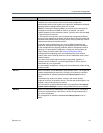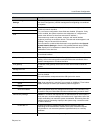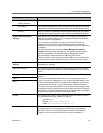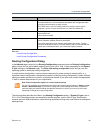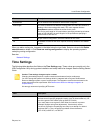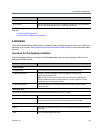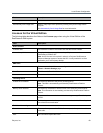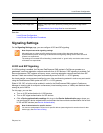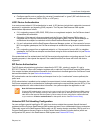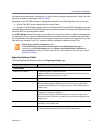
Local Cluster Configuration
Polycom, Inc. 65
Password
Confirm password
The password for the user name entered above.
EAP Method The Extensible Authentication Protocol method used to establish trust with the
authentication server (this is also known as the outer authentication protocol).
Protocol When a TLS tunnel is established with the authentication server, the protocol
used within the tunnel (this is also known as the inner authentication protocol).
Shared Signaling Network
Settings
The settings in this section are enabled only if management and signaling
traffic are on separate networks. If so, they apply to the entire system (both
servers in two-server configuration).
For a one-server configuration, the virtual host name and IP fields are
disabled. (Exception: If only IPv6 is enabled, the system must have two
addresses, so a single-server system must still have a virtual host name and
IP address.)
The settings are the same as those in Shared Management Network
Settings, except that under Signaling Link, the signaling network interface
(eth2) can be disabled. This capability exists for debugging purposes.
The eth2 interface corresponds with the GB3 jack on the server.
(The eth1 interface, which corresponds with the GB2 jack, is reserved for the
private network connection between the two servers in a two-server cluster.)
General System Network
Settings
The settings in this section apply to the entire system and aren’t specific to
management or signaling.
DNS search domains One or more fully qualified domain names, separated by commas or spaces.
The system domain you enter below is added automatically, so you need not
enter it.
DNS 1 IP addresses of up to three domain name servers. At least one DNS server is
required.
Your Polycom RealPresence DMA system must be accessible by its host
name(s), not just its IP address(es), so you (or your DNS administrator) must
create A and/or AAAA records for IPv4 and IPv6, respectively, as well as the
corresponding PTR records, on your DNS server(s). A/AAAA records and
PTR records that map each physical host name to the corresponding physical
IP address and each virtual host name to the corresponding virtual IP address
are mandatory, as are the corresponding PTR records that allow reverse DNS
resolution of the system’s physical or virtual host name(s).
DNS 2
DNS 3
Domain The domain for the system. This is combined with the host name to form the
fully qualified domain name (FQDN). For instance:
Host name: dma1
Domain: callservers.example.com
FQDN: dma1.callservers.example.com
Signaling DSCP The Differentiated Services Code Point value (0 - 63) to put in the DS field of
IP packet headers on outbound packets associated with signaling traffic.
The DSCP value is used to classify packets for quality of service (QoS)
purposes. If you’re not sure what value to use, leave the default of 0.
Field Description



